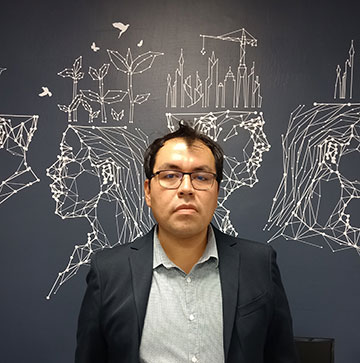
David Serrano
In this installment of Senior Member Insights, OPN talks with David Serrano, a research professor at Guadalajara University in Guadalajara, Jalisco, Mexico. Serrano received his B.S. in engineering physics from the Tecnológico de Monterrey, Campus Monterrey in 2008 and his master’s and Ph.D. in optical sciences from the Optical Research Center (CIO) in Mexico in 2010 and 2014, respectively. From 2014 to 2017, he occupied a postdoctoral position at the Center for Optical Research and Education (CORE) at Utsunomiya University in Japan.
Serrano’s research interests cover phase-dynamics measurements by employing interferometric techniques and related polarization-sensitive measurements based on Jones and Mueller matrix approaches.
What first interested you in pursuing science?
As a bachelor’s student, I did a summer academic internship at a research laboratory and I went to an optical research center implementing 3D reconstruction techniques. I was impressed by 3D surface retrieval with the computer, the laboratory instruments, the scientific programming and the skills I could apply there from my studies. I enjoyed that time so much that I went again the next year to continue my master’s and then my Ph.D. studies in the same lab.
Joining the student chapter also reinforced my interest in science during my bachelor studies, as senior student members guided me to apply for scholarships and conferences and meet other researchers.
What aspect of your current work is the most interesting or exciting?
“ I enjoy building, planning, sketching and using optics instruments. ”
—David Serrano
I enjoy building, planning, sketching and using optics instruments. One of my duties is supporting a bachelor program in optics offered by Guadalajara University. Graduation requirements include building an instrument employing optics/photonics fundamentals. Several students joined our lab for that purpose, and we guided them during this process. For example, we recently built an affordable solution to detect naturally polarized light in remote scenes. The imaging unit employs a webcam, a Raspberry Pi unit and a cheap liquid-crystal cell used as a shutter in electro-optics DIY projects.
What tips for successful networking do you have for early-career professionals?
Attend conferences to meet and interact with other researchers in the same field. You will find it very useful to talk with people with the same research interests as you.
What professional resources do you rely on to stay active and engaged with your field?
I attend webinars, read journal papers about my research area and keep active memberships in the optical societies. They usually publish notes related to current trends in optics and help you to stay engaged in your research area.
What skills do you think are most important for someone interested in a career like yours?
Never stop learning or improving your skills. I believe this makes the difference between peers and colleagues with similar academic backgrounds.
What’s the best career decision you’ve ever made, and why?
Study abroad. During my last Ph.D. year, I lived in Japan at Utsunomiya University as a research intern and then I stayed for three more years as a postdoc. My wife and I packed our stuff and moved to live there. During my time working there, she also joined the Ph.D. program. That was a clean start for us; we made new friends and acclimated to a different working environment, enriching our perspective. Working in a different lab than I had during my master’s and Ph.D. helped me after my return to Mexico.
What advice do you have for young scientists who are discouraged about their current work or career path?
“ Spend time searching for what you enjoy and are interested in. ”
—David Serrano
Spend time searching for what you enjoy and are interested in. Sometimes, we get confused while teaching, managing and researching forgetting what we like to do. Grow that part and get professional help if you need it.
What is one piece of advice that you wish you were given as a student/early in your career?
Build healthy habits like exercising and eating healthy meals. I have met a few senior professors, most of whom have that in common. We spend so much time on the computer or enclosed in lab duties that we neglect those habits.
What habits do you frequently rely on that help you to succeed?
I’m a big fan of the Pomodoro technique. I started using it during my Ph.D. thesis, which helped me measure how much effort I put into things. Nowadays, I use it even for personal projects.
Some websites combine Kanban boards with the Pomodoro timer, which helps me organize and record all my duties and obligations.
If you weren’t in the sciences, what would be your dream career?
I would be a software developer; since childhood, I have liked working with and learning about computers. In high school, my father signed me up for a programming course that I really enjoyed.
